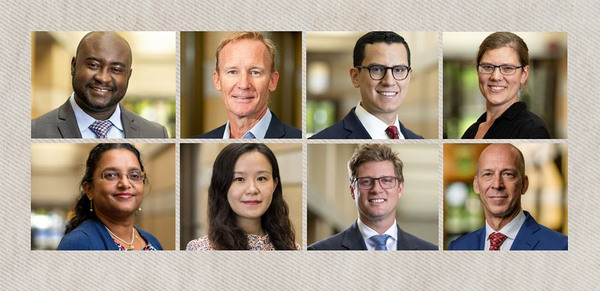The Pulte Institute recently welcomed eight new core affiliated faculty members whose work is distinguished by an emphasis on poverty and inequality and the social dimensions of environmental issues:
Ellis Adjei Adams is an Associate Geography and Environmental Policy Professor at the Keough School. Adams’ work examines the social, political, institutional, and governance dimensions of environmental and natural resources, particularly water in the global South. His current research converges on three main domains: 1) urban water insecurity, 2) water policy and governance, and 3) gender, water, and sustainable development. He is a co-principal investigator on a National Science Foundation-funded project, “Analyzing the Magnitude, Variability, and Governance of Infrastructure-Mediated Flows in Atlanta,” with collaborators at Georgia State University.
Krister Andersson is the Notre Dame Professor of Sustainable Development at the Keough School. Andersson studies the politics of environmental governance with a particular focus on local institutional arrangements and the role they play in explaining policy outcomes. The National Science Foundation, the U.S. Department of Agriculture, the National Oceanic and Atmospheric Administration, and numerous other agencies and private foundations have funded his field-based research program.

Alejandro Estefan is an Assistant Professor of Development Economics at the Keough School. Estefan’s research focuses on understanding the causes of economic development to inform policy decision-making. He studies many essential topics in the field of development economics, including the factors lifting individuals out of poverty, the effects of public investments in schooling, and more. Estefan’s research approach relies on applying rigorous econometric techniques to uncover the crucial causal mechanisms underlying economic development through the analysis of longitudinal datasets and the use of structural theory.
Emily Grubert is an Associate Professor of Sustainable Energy Policy at the Keough School. Grubert is a civil engineer and environmental sociologist who studies how we can make better decisions about large infrastructure systems, particularly related to the justice-centering decarbonization of the U.S. energy system. She studies life cycle socioenvironmental impacts associated with future policy and infrastructure and how community and societal priorities can be better incorporated into multicriteria policy and project decisions. Her major methods include scenario analysis, life cycle assessment, survey and interview research, and text mining.
Lakshmi Iyer is a Professor of Economics and Global Affairs at the Keough School, as well as a Kellogg Institute and a Liu Institute for Asia and Asian Studies faculty fellow. As a development economist, Iyer examines many dimensions of the distribution of political power within emerging market countries, including the legacy of colonial rule, the division of authority between politicians and bureaucrats, and the determinants of conflict. She is currently working on projects on the determinants and consequences of women’s political participation. She co-leads the Building Inclusive Growth (BIG) Lab, developing solutions to help vulnerable populations in developing countries.
Sisi Meng is an Assistant Teaching Professor of Economics and Technology for Development at the Keough School and a faculty affiliate of Notre Dame’s Environmental Change Initiative. Meng’s research focuses on environmental and natural resource economics topics and the interdisciplinary studies between labor, health, development, socioeconomics, and geography. She is particularly interested in applying geographic information system (GIS) techniques to spatial cost-benefit analysis of complex environmental issues. Meng aims to bring rigorous theoretical and empirical analysis to improve climate-related decisions and consequently improve social well-being.
Daniel C. Miller is an Associate Professor of Environmental Policy at the Keough School and the director of the sustainable development concentration for the Master of Global Affairs program. Miller’s research and teaching focus on international environmental politics and policy. He is especially interested in understanding the socioeconomic and ecological impacts of conservation funding in tropical countries. He also explores how forests and trees contribute to human well-being in rural areas worldwide. He coordinates the Forests and Livelihoods: Assessment, Research, and Engagement (FLARE) network.
Paul Winters is Associate Dean for Academic Affairs and the Keough-Hesburgh Professor of Global Affairs at the Keough School. Winters’s research and teaching focus on rural poverty and food insecurity and the evaluation of policies and programs designed to address these issues. Before joining the Keough School, Winters served as Associate Vice President of Strategy and Knowledge and Director of Research and Impact Assessment at the International Fund for Agricultural Development in Rome. He is a member of the Food System Economics Commission, an independent academic commission aiming to support policy with research on sustainable food systems.